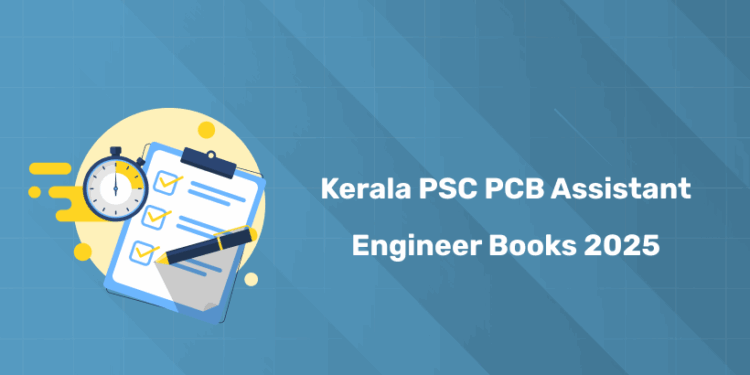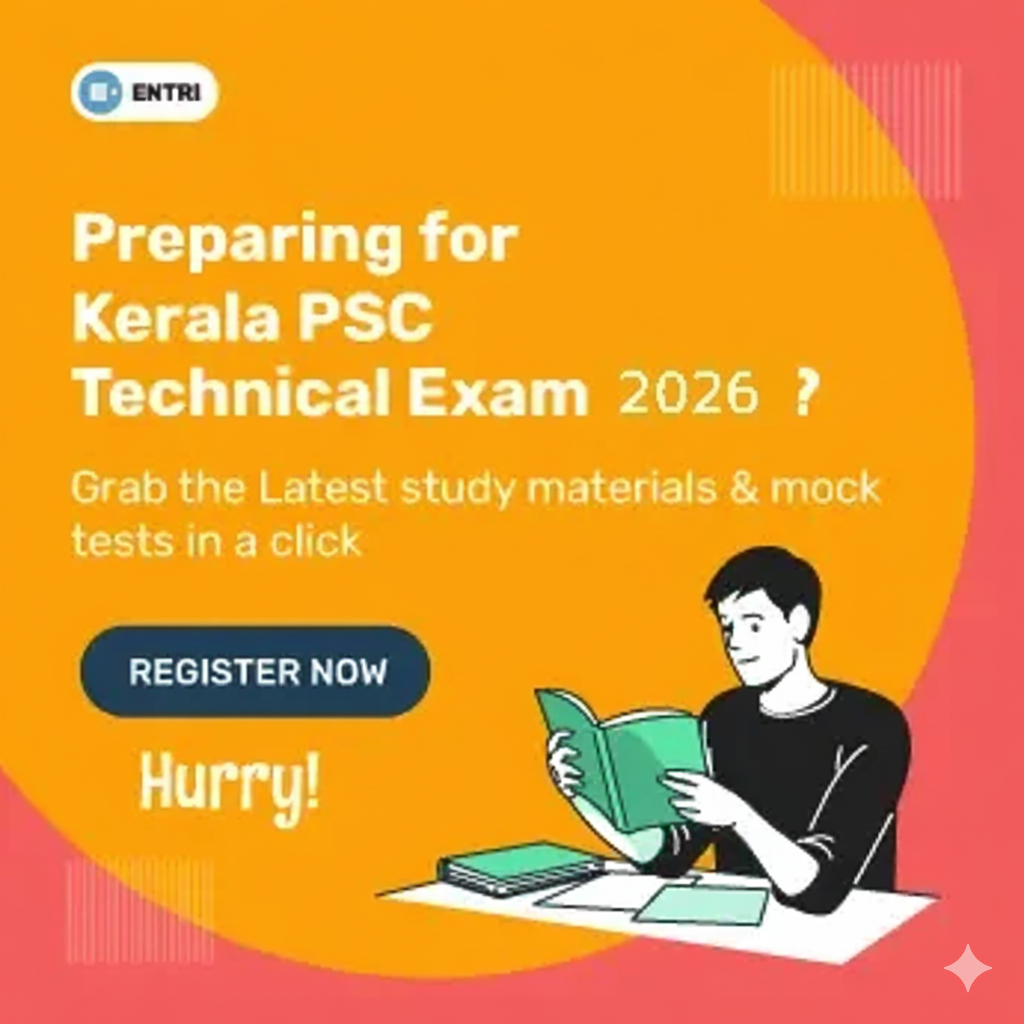Table of Contents
The Kerala PSC Pollution Control Board Assistant Engineer notification (Category No. 357/2025) is released, and aspirants can now start preparing with the latest syllabus. To cover all topics in detail, you need the right reference books. In this blog, we provide a module-wise list of recommended books to help you plan your preparation efficiently. Check it out!
Kerala PSC PCB Assistant Engineer Notification 2025 Highlights
| Event | Details |
|---|---|
| Recruiting Organization | Kerala Public Service Commission (KPSC) |
| Department | Kerala State Pollution Control Board |
| Post Name | Assistant Engineer |
| Category Number | 357/2025 |
| Pay Scale | ₹ 39,500 – 83,000 /- |
| Vacancies | Anticipated |
| Notification Release Date | September 15, 2025 |
| Application Start Date | September 15, 2025 |
| Last Date to Apply | October 10, 2025 (up to 12:00 midnight) |
| Mode of Application | Online only (via Kerala PSC Thulasi Profile) |
| Official Webiste | www.keralapsc.gov.in |
Kerala PSC PCB AE Syllabus 2025 PDF
1: Between the period of 1858-1947, how many Viceroys ruled over India?
Before selecting the right books for preparation, it’s important to review the official Kerala PSC PCB Assistant Engineer syllabus. The syllabus provides a clear outline of all topics and subjects, helping candidates choose the most relevant reference materials for effective and focused study.
Prepare for Kerala PSC Technical Exams with Entri
സർക്കാർ ജോലി എന്ന സ്വപ്നം ഇനി സ്വപ്നം മാത്രമല്ല! Join Kerala's Top-rated PSC Coaching Programs
Join NowKerala PSC PCB Assistant Engineer (AE) Previous Question Paper PDF
| Paper Code | |
|---|---|
| 073/2022 |
Kerala PSC PCB Assistant Engineer (AE) Books 2025 for Reference
For a focused preparation for the Kerala PSC PCB Assistant Engineer 2025 exam, we’ve curated a module-wise list of essential books. These resources cover all key topics, concepts, and practice problems, helping candidates build a strong foundation on each topics.
Module 1 – Mathematics, ODE, Complex Analysis, Fourier, Laplace
-
Higher Engineering Mathematics – B.S. Grewal
-
Advanced Engineering Mathematics – Erwin Kreyszig
-
Ordinary & Partial Differential Equations – T. Veerarajan
-
Vector Calculus, Linear Algebra & Complex Analysis – Shanti Narayan
-
Engineering Mathematics – R.K. Jain & S.R.K. Iyengar
Module 2 – Mechanics, Structural Engineering, Concrete & Steel Design
-
Strength of Materials – R.K. Bansal
-
Mechanics of Materials – Beer & Johnston
-
Reinforced Concrete Design – P.C. Varghese / S. Ramamrutham
-
Design of Steel Structures – S. Ramamrutham / L.S. Negi
-
Theory of Structures – R. Subramanian
-
Building Materials and Construction – B.C. Punmia
Module 3 – Surveying, Fluid Mechanics, Water Resources, Geotechnical, Transportation
-
Surveying Vol I & II – B.C. Punmia
-
Fluid Mechanics – R.K. Bansal / Modi & Seth
-
Irrigation and Water Resources Engineering – P.N. Modi / R.K. Sharma
-
Geotechnical Engineering – V.N.S. Murthy / C.V. Arora
-
Transportation Engineering – L.R. Kadiyali / C.S. Papacostas & Prevedouros
-
Urban Planning & Highway Engineering – S.K. Khanna & C.E.G. Justo
Module 4 – Environmental, Water & Wastewater Engineering
-
Environmental Engineering (Vol I & II) – Peavy, Rowe & Tchobanoglous
-
Water Supply and Sanitation – S.K. Garg
-
Wastewater Engineering – Metcalf & Eddy
-
Air Pollution & Solid Waste Engineering – K.C. Patra / H.S. Peavy
-
Environmental Engineering Handbook – Howard S. Peavy
Module 5 – Chemical Engineering, Process Calculations, Thermodynamics, Reaction Engineering
-
Chemical Engineering Thermodynamics – Smith, Van Ness & Abbott
-
Elementary Principles of Chemical Processes – Felder & Rousseau
-
Introduction to Chemical Engineering – J.M. Coulson & J.F. Richardson
-
Unit Operations of Chemical Engineering – McCabe, Smith & Harriott
-
Chemical Reaction Engineering – Octave Levenspiel
-
Process Calculations and Stoichiometry – K.V. Narayanan
Module 6 – Process Instrumentation & Analytical Methods
-
Process Control & Instrumentation – D.P. Eckman / B.G. Liptak
-
Instrumentation and Control Systems – C.D. Johnson
-
Industrial Instrumentation – H. K. Singh
-
Environmental Instrumentation & Analysis – S.P. Mahajan
Preparation Strategy Using Books for Kerala PSC PCB AE 2025
1. Understand the Syllabus First
-
Before picking up any book, carefully go through the official syllabus.
-
Note down topics, modules, and subtopics to identify which book covers what.
2. Select the Right Books
-
Use the module-wise book list recommended for the exam.
-
Focus on books that include theory, solved examples, and practice problems.
3. Create a Study Plan
-
Divide your preparation module-wise and allocate specific days or weeks for each book.
-
Include time for revision and solving previous year questions (PYQs).
4. Read Conceptually First
-
Start by understanding the concepts before jumping into numerical problems.
-
Take notes and highlight important formulas or definitions.
5. Practice Regularly
-
Solve numerical examples and practice problems from the books.
-
Attempt previous year questions to familiarize yourself with the exam pattern.
6. Revise & Recall
-
Periodically revise important topics using your notes.
-
Practice recalling formulas, diagrams, and key points without looking at the book.
7. Test Yourself
-
Take mock tests or timed quizzes to evaluate your preparation.
-
Identify weak areas and revisit the relevant book chapters.











